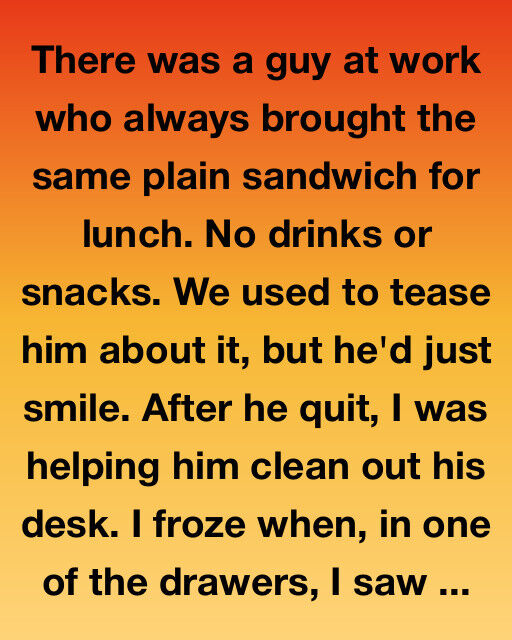Paul was never loud, never seeking attention, just the kind of coworker who blended seamlessly into the rhythm of the office — quiet, punctual, predictable. He arrived every morning at precisely 8:45 a.m., placed his plain brown briefcase under his desk, and opened his laptop before most people had even finished their first sip of coffee. He wore the same navy sweater every Tuesday, the same black shoes polished to a muted shine, and ate the same plain sandwich for lunch, day in and day out. To the casual observer, Paul was just another face in the office crowd — unremarkable, almost invisible.
But behind that unassuming routine was a life quietly devoted to something extraordinary. Those sandwiches weren’t just his lunch; they were his mission, his secret act of compassion that most people never saw. Each morning, Paul rose before dawn in his modest apartment, carefully assembling dozens of sandwiches — peanut butter and jelly, turkey and cheese, sometimes even a simple egg salad — each one wrapped meticulously in wax paper. Inside every packet, he slipped a small note: a line of encouragement, a quote about hope, or a tiny doodle meant to brighten a stranger’s day. By the time he arrived at work, carrying a small tote bag that looked ordinary to any passerby, he had already spent an hour preparing the food he would deliver to the children at the West End Library, kids who often arrived hungry, overlooked, and in need of a kind gesture that told them, you matter.
Paul’s dedication wasn’t born from obligation but from experience. Growing up in foster care, he had known hunger, instability, and the sharp sting of neglect. He had learned early on that small acts of kindness could feel like lifelines, and he dedicated his adult life to ensuring no child felt as unseen as he once had. He never posted about it online, never sought recognition, and never let the exhaustion of pre-dawn mornings or the late-night tallying of sandwiches dissuade him from his task. To him, it was simply something that needed to be done.
When his secret finally came to light, it was almost accidental. A coworker had noticed the tote bag and a stray note tucked into Paul’s desk drawer, curious about the neat handwriting. “What’s this?” she asked one Friday afternoon, and Paul had shrugged, as if it were nothing. But as the details unfolded — the dozens of sandwiches delivered each week, the hours he had spent quietly supporting children he would never meet — his colleagues began to see him differently. He was no longer the quiet man who had blended into the background; he was a hero, unassuming but relentless, a person whose compassion left a tangible impact on the world around him.
The office was abuzz with admiration and disbelief. People wanted to know how someone so seemingly ordinary could have such extraordinary dedication. Paul, true to form, deflected the attention with a modest shrug. “It’s not about me,” he would say, eyes downcast. “It’s about making sure someone gets a meal when they need it.”
Even after an incident where he collapsed from exhaustion during a particularly busy week, the movement he had started — which colleagues affectionately named “Sandwich Fridays” — grew. Inspired by his example, coworkers began preparing their own lunches to donate, local businesses offered to sponsor bread and supplies, and volunteers from the community joined in. The ripple effect of Paul’s quiet dedication extended far beyond the office walls, touching the lives of dozens of children each week and inspiring others to act with the same humble determination.
Paul’s story became more than a tale of sandwiches; it became a narrative about resilience, empathy, and the power of small gestures. One Meal Ahead, the nonprofit that eventually grew from his initiative, continues to distribute thousands of meals each month, each accompanied by a note, each infused with the quiet love and care that Paul had shown from the beginning. People began sharing stories of how one sandwich, one note, one act of daily consistency, could change a life in ways that no grand gesture ever could.
Even in his modest apartment, Paul remained unchanged by recognition. He still woke before dawn, still wrapped the sandwiches with the same careful precision, still scribbled notes meant to inspire hope. To him, fame or accolades were irrelevant. What mattered was the knowledge that somewhere, a child would eat a meal and feel noticed, cared for, and valued.
Paul’s legacy is a testament to the idea that true change does not always begin with a grand plan or a public announcement. Sometimes, it begins quietly — with a single sandwich, a small note, and a heart that refuses to give up, even in the face of a world that often overlooks the quiet heroes among us. And in the lives of those children, and the community that grew around his actions, Paul’s kindness became something much larger than the sum of its parts: a quiet revolution of empathy, nurtured one sandwich at a time.
